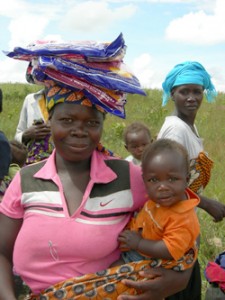Recently the House of Representatives passed a Continuing Resolution to fund the federal budget for the rest of the fiscal year 2011. The legislation slashes programs that save the lives of some of the poorest people on the planet. These programs have been championed by Republicans and Democrats in the past, but now some of the most cost-effective programs our government funds to help combat pandemic diseases and eliminate poverty are on the chopping block. [Read more…]
A Case for Evidence-Based Communication Campaigns in Angola

A mother carries home LLINs for her family following a net distribution campaign. Source: PSI/Angola
Malaria is one of the largest health concerns in Angola, particularly for pregnant women and young children. Using a long-lasting insecticide-treated net (LLIN) can greatly reduce the risk of malaria. The Ministry of Health is scaling up malaria control activities with expansion of net distribution as well as communication activities for behavior change to encourage the use of a net every night.
With support from the President’s Malaria Initiative and ExxonMobil, the Global Fund to Fight AIDS, Tuberculosis and Malaria, Population Services International (PSI) works with the National Malaria Control Program to develop communication campaigns based on evidence gathered through research to promote healthier behaviors for malaria control.
All communication campaigns are based on in-depth research into behaviors related to malaria control. These results help target communication campaigns to achieve the desired behavior change for malaria prevention and treatment. A recently completed qualitative study supported by Global Fund Round 7 looked at behaviors and beliefs of pregnant women and caregivers of children under the age of 5 years to further understand why mosquito nets are or are not used. In-depth interviews were complemented by a photo narrative of the women’s lives, where study participants took pictures of important factors in their lives that influence their health and the health of their children. Results were analyzed by groups – those who always use a net and those who do not consistently use a net. [Read more…]
Global Fund Responds to News Stories About Corruption in Grant Spending
Officials from the Global Fund to Fight AIDS, Tuberculosis and Malaria are criticizing recent media reports of misuse of Global Fund grants. They say the reports are based on incidents that occurred and were acted on last year and contain no new revelations.
The media reports claim corruption is taking a big bite out of the billions of dollars of grant money disbursed by the Global Fund. And, they contend as much as two-thirds of some grants are used fraudulently.
The Fund’s Executive Director, Michel Kazatchkine, says the Global Fund has zero tolerance for corruption and actively seeks to uncover any evidence of misuse of its funds.
He says the incidents referred to in recent media reports concern the grave misuse of funds in four of the 145 countries that receive grants. He says those cases figured prominently in last year’s Inspector General’s report.
“As a result, immediate steps were taken in Djibouti, in Mali, in Mauritania and in Zambia, to recover misappropriated funds and to prevent future misuse of grant money,” he said. “In total, the Global Fund is demanding the recovery of $34 million unaccounted for in these and other countries out of a total disbursement of $13 billion.”
Kazatchkine says criminal proceedings are underway in Mali, Mauritania and Zambia. He says the Fund has suspended relevant grants in Mali and Zambia and ended another grant in Mali.
Kazatchkine says transparency is a fundamental principle behind all of the work of his organization. He adds the Global Fund is fully accountable to its donors about all of its expenditures and is committed to preventing any misuse of its money.
”What is of concern to me, of course, is that this shakes beyond that a global public opinion somehow at a time when governments are under pressure to cut public expenditures and where millions of lives that depend on the Global Fund and the hope the Global Fund is bringing to the world could thus be at risk,” said Kazatchkine.
Kazatchkine says the lives of 4,000 people suffering from AIDS, tuberculosis and malaria are saved every day as a consequence of the grant money disbursed by the Fund.
He says the Fund and the Office of the Inspector General are strengthening efforts to prevent fraud. He says so-called higher risk countries are being closely monitored to make sure none of the money goes astray.
Source: VOA